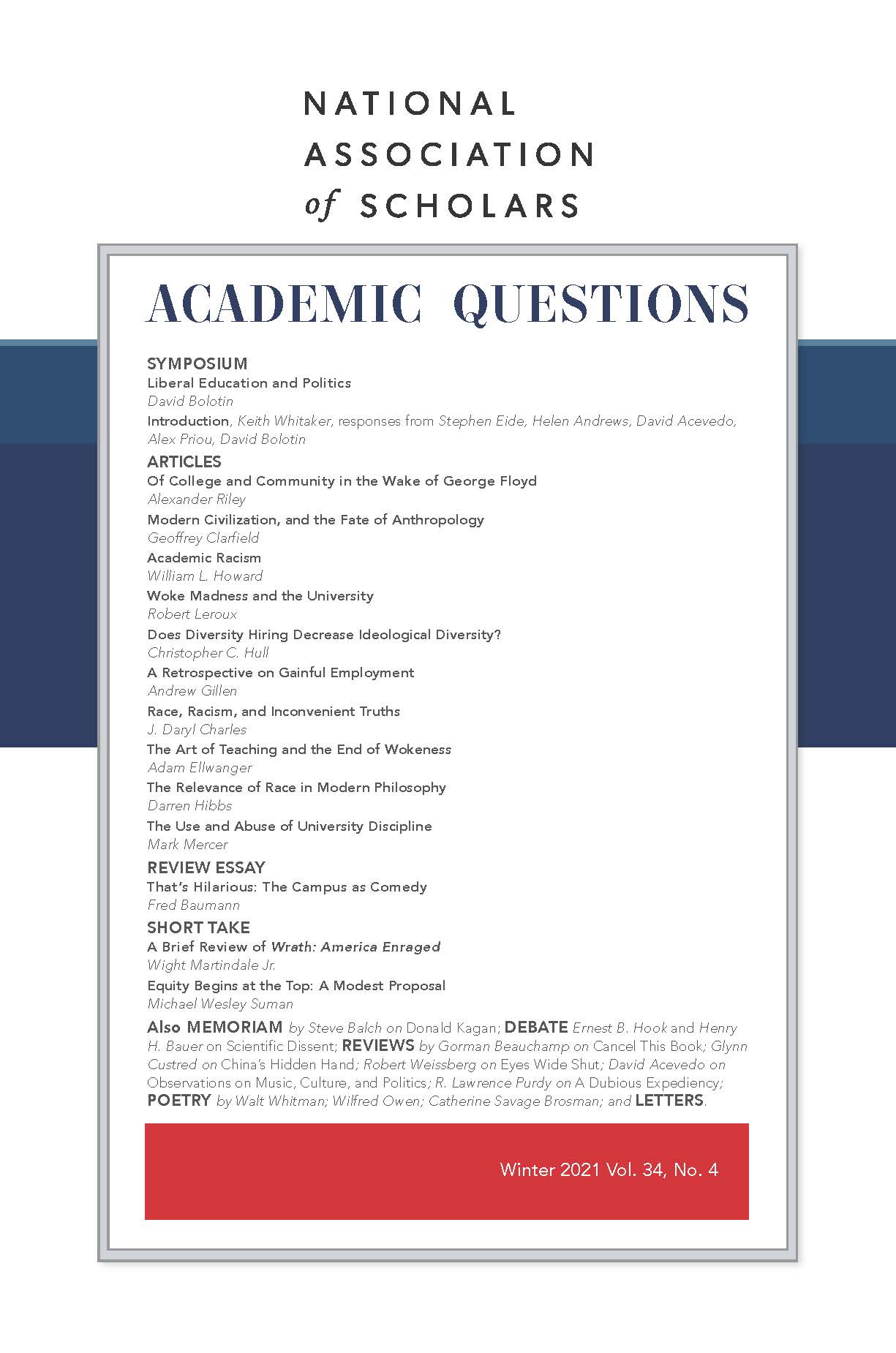Henry H. Bauer is Dean Emeritus of Arts & Sciences, Professor Emeritus of Chemistry & Science Studies, Virginia Polytechnic Institute & State University; [email protected]. He is the author of “Fact Checking Is Needed in Science Also” (Summer 2021).
I agree with Professor Hook that “the issue of the fate of minority views in science is nuanced and complex,” but it is possible to capture only a part of this complexity in a single article. Perhaps I should have written that minority views in the scientific community are “routinely” dismissed rather than “automatically”; or, closer to the complex circumstances, “unorthodox views, by definition espoused by a minority and incompatible with contemporary consensual belief, are given short shrift when first suggested, and are rarely taken seriously even later, unless it becomes obvious to almost everyone that the orthodox theory is no longer tenable.”
The simple fact is that discussion of unorthodox claims and interpretations is not welcomed in the scientific literature and is rarely featured in the mass media. Consequently, the wider public, very much including policymakers, remains largely unaware that there are voices dissenting from the mainstream consensus on many topics. Prime examples, matters of major public importance and considerable economic significance, are HIV/AIDS and global warming.
Hook describes instances in which the scientific community eventually incorporated novelties, which is the way science has normally progressed in the past. But my concern is with the outliers, the hard cases that fall through the cracks. Thus, Hook and I are talking past one another rather than truly engaging. We disagree primarily because Hook trusts the mainstream consensus on the two topics I mentioned above, whereas I have learned that the consensuses on them happen to be wrong. In generalizing, we then each emphasize different aspects of the complex activity that is “science” and the fate of minority views. Unfortunately, Hook is plainly wrong on some salient facts.
Cancer researcher and National Academy of Sciences member Peter Duesberg was indeed effectively excommunicated after dissenting over HIV, cut off from federal funding, and firmly warned not to attend professional meetings (Anthony Fauci and Robert Gallo refused to attend meetings if Duesberg was invited). Duesberg’s own university department sent him to the Siberia of a laboratory in another building. He was able to continue his cancer research only through funding by private patrons.1 Duesberg’s arguments against HIV were never addressed let alone answered: Robert Gallo failed to deliver the response to Duesberg that he had promised the editor of the Proceedings of the National Academy.2
Hook’s account of Nobelist Kary Mullis, inventor of the Polymerase Chain Reaction, is again at variance with the facts. Hook states that Mullis “was too focused on the fact that the interval between HIV infection and AIDS may be very prolonged.” Not so. Mullis wrote at length of his unsuccessful attempts to locate published proof that HIV causes AIDS,3 and later pointed out that the technique he had invented (PCR) was being abused and misinterpreted in claimed measurements of “viral load.”
The evidence that HIV does not cause AIDS is available in dozens of books and hundreds of primary research articles cited in “The case against HIV.”4
That the claim of human-caused climate change is far from “settled” is also set out in many books, articles, and websites, perhaps most recently and authoritatively in Unsettled5 by physicist Steven Koonin, who has rather impeccable mainstream credentials in science policy as well as in science. A quick demonstration is the lack of correlation between levels of carbon dioxide and global temperatures over the whole life of the Earth.6
The mainstream reaction to Koonin’s judicious, fact-based book illustrates the argument I am making about the fate of messengers of contrarian views: see the several rather mean-spirited, nonsubstantive reviews of Koonin’s book;7 by contrast, at Goodreads the book is rated 4.47/5 on 805 responses and 4.7/5 on 2,067 ratings at amazon.com.
Evidently Professor Hook did not delve in sufficient depth into those subjects and instead ventures personal remarks about some individuals, including three Nobel Prize winners.
Several decades of my career were spent in research in chemistry, allowing me to know first hand that the international community of chemists had the highest possible regard for Linus Pauling, whose work on the nature of the chemical bond in its day revolutionized the field. Pauling made the groundbreaking discovery in molecular medicine that linked structural defects in hemoglobin molecules to the disease of sickle-cell anemia.
For anyone to call any misstep by Pauling about the structure of DNA “an elementary mistake in chemistry” is ridiculous, and displays ignorance of the fact that all human beings, no matter how talented and accomplished, are not infallible.
Professor Hook is also wrong to dismiss Kary Mullis’s opinion because Mullis is, a biochemist, neither a "virologist, an epidemiologist, nor a clinician”; and Pauling’s sponsoring of vitamin C because “[i]n the field of nutrition and preventive medicine, Pauling had no expertise”; and Duesberg on HIV/AIDS because “[h]is background is in biochemistry and molecular biology, not in medicine or public health.”
One need not be an active researcher in one particular aspect of any matter to be able to reach an informed, evidence-based opinion by reading the primary literature and interacting in person with researchers on pertinent topics, as Duesberg, Mullis, and Pauling certainly did.
The lack of attention to dissent from a mainstream consensus has become a contemporary problem because science is not, or perhaps is no longer, the disinterested truth-seeking activity still envisaged by the conventional wisdom: it has been co-opted and corrupted by outside interests and internally by corresponding conflicts of interest and careerism.8
As I argue in the article cited by Hook, something like a Science Court is needed as a safeguard against damaging public policies and actions based on mistaken advice from mainstream science, as happened in the twentieth century under the mistaken consensus on heritability and eugenics.
1 Jeanne Lenzer, “Peter's Principles,” Discover 29, no. 6 (June 2008): 6.
2 “This paper, which reflects the author’s views on the causes of AIDS, will be followed in a future issue by a paper presenting a different view of the subject”; asterisked footnote on first page of Peter H. Duesberg, “Human Immunodeficiency Virus and Acquired Immunodeficiency Syndrome: Correlation but not Causation,” Proceedings of the National Academy of Sciences, 86 (1989): 755-64.
3 Kary Mullis, Dancing Naked in the Mind Field (Vintage Books, 2000), ch. 18 (171 ff.).
4 Henry H. Bauer, “The Case against HIV,” http://thecaseagainsthiv.net, last updated December 2017.
5 Steven E. Koonin, Unsettled: What Climate Science Tells Us, What It Doesn't, and Why It Matters (Benbella Books, 2021).
6 Henry H. Bauer, “Climate-change facts: Temperature is not determined by carbon dioxide,” https://scimedskeptic.wordpress.com/2017/05/02/climate-change-facts-temperature-is-not-determined-by-carbon-dioxide.
7 Mark Boslough, “A critical review of Steven Koonin’s Unsettled,” Tilting at strawmen, May 25, 2021, https://yaleclimateconnections.org/2021/05/a-critical-review-of-steven-koonins-unsettled.
Bob Ward (Grantham Research Institute on Climate Change and the Environment, London School of Economics and Political Science) writes “the book is not a robust guide to the subject and is based on a number of inaccurate and misleading claims, flawed studies, and cherrypicked information” (LSE, Phelan U.S. Centre), https://bit.ly/3iKMJet.
Gary Yohe writes, “A new book manages to get climate science badly wrong: In Unsettled, Steven Koonin deploys that highly misleading label to falsely suggest that we don’t understand the risks well enough to take action, Scientific American, May 13, 2021,
https://www..com/article/a-new-book-manages-to-get-climate-science-badly-wrong.
8 Henry H. Bauer, Science Is Not What You Think: How It Has Changed, Why We Can’t Trust It, How It Can Be Fixed (McFarland, 2017).
Image: jarmoluk, Public Domain













